2019 Global Blockchain Policy Annual Report: China focuses on support, and the US mostly regulates
The blockchain has ushered in a more "sci-fi" year of 2020. Looking back at the development of blockchain in 2019, it is impossible to ignore the blockchain policy information published by various countries.
Interchain Pulse counts more than 600 blockchain policy information from 82 countries, regions and international organizations worldwide in 2019. The policy information is analyzed from several dimensions, including time, region, and key content.
From the perspective of time, the beginning and end of 2019 are the two peak periods for the announcement of blockchain policy information, and the policies at the beginning and end of the year are mostly supportive, and the middle of the year is mainly regulatory.
From a geographical point of view, Asia is the region with the largest amount of blockchain policy information in 2019 on all continents, and Europe is the region with the most countries that have published blockchain policy information.
- 2020 Central Bank Working Conference: Continue to steadily advance the development of fiat digital currencies
- SAFE lays out work in 2020: supports new business formats, and promotes the construction of cross-border financial blockchain service platforms
- Filecoin Ultimate Guide: An Overview of How It Works, Parsing Protocols, and Possible Improvements
From the point of policy, the high-frequency words of global blockchain policy information are cryptocurrency, finance, central bank, and exchange; while the high-frequency words of domestic blockchain policy information are currency, industry, finance, integration, and big data .
2019 global blockchain policy information: Asia has the largest number, and the United States, Japan, and Russia all focus on regulation
According to statistical data, Interchain Pulse has sorted out the blockchain policy information in 2019 by month. The month with the largest number was January, with a total of 77 blockchain policy information; followed by April and March, there were 61 and 58 blockchain policy information, respectively. September in the second half of the year is the lowest point in the number of global blockchain policies this year, with only 27. After October, the number of blockchain policies has increased significantly. In November and December, there were 56 and 51 blockchain policy information, respectively.
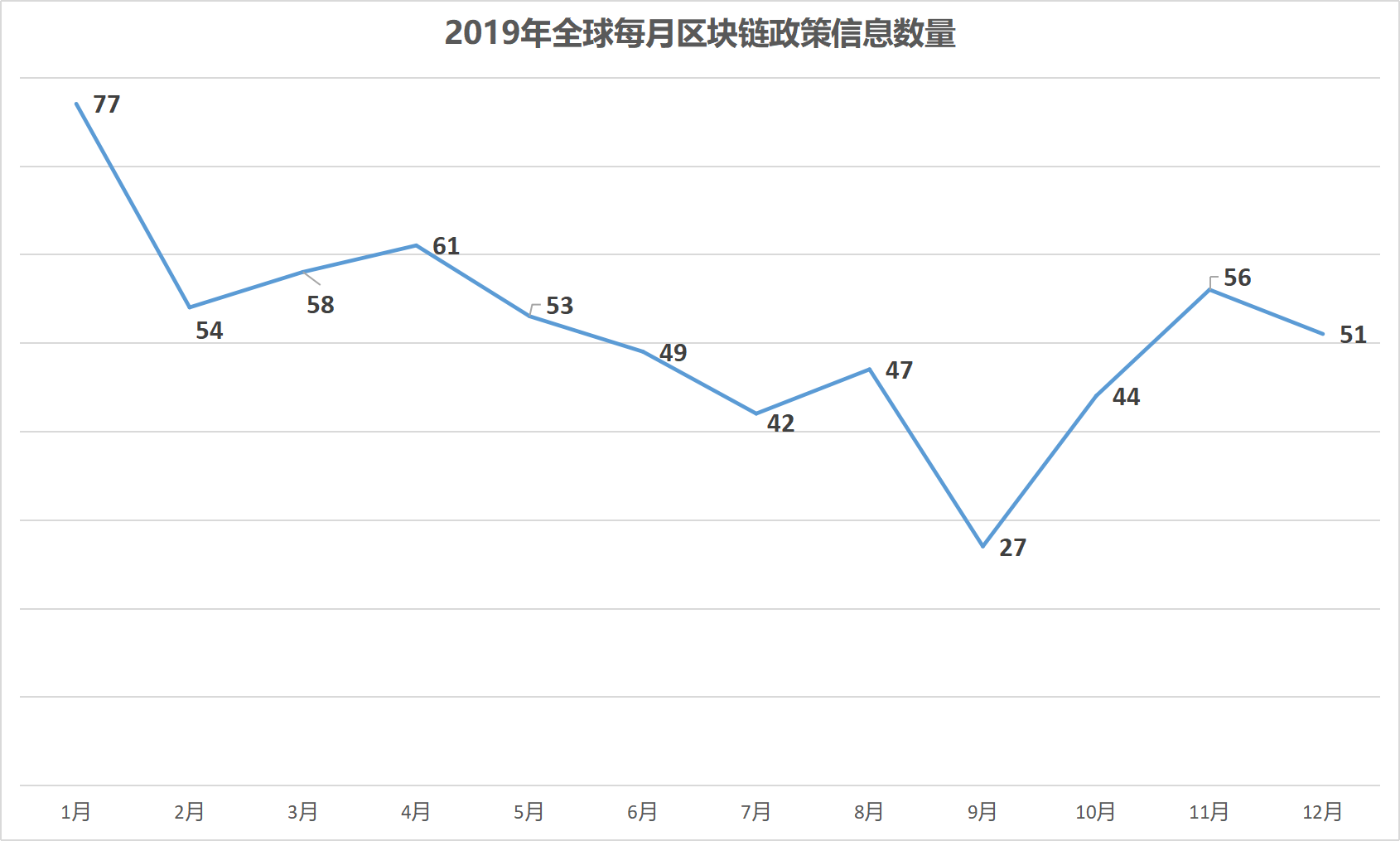 (Drawing: Interlink Pulse Academy)
(Drawing: Interlink Pulse Academy)
Based on this, Interchain Pulse further focuses on the amount of monthly policy information related to blockchain support and supervision. According to statistics, the support-oriented months and the regulatory-oriented months accounted for half of the year.
Among them, the opening year of 2019 is mainly supportive, and from May to August, the policy is mostly based on supervision, and then from September to December, it is mainly supportive. This has nothing to do with the two major issues of "the Libra White Paper released in June and China's promotion of the blockchain to the height of national strategy at the end of October".
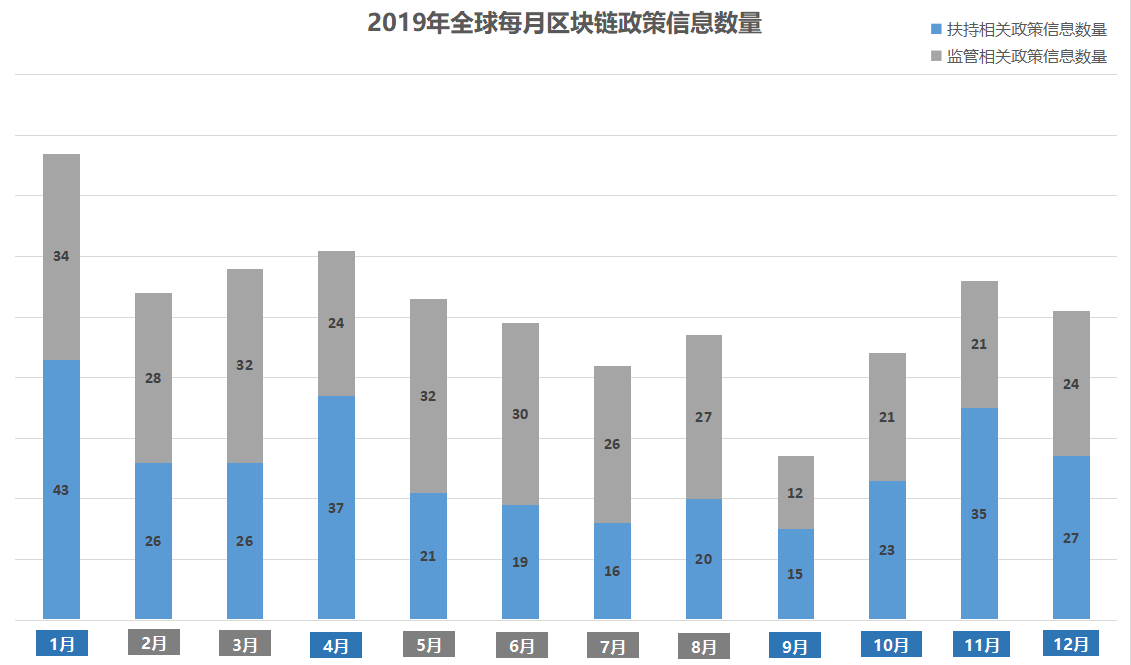
(Support is based on the monthly standard blue; supervision is based on the monthly standard gray mapping: Interlink Pulse Research Institute)
The monthly distribution of blockchain policy information is affected by China and the United States, and the geographical distribution of the area is also affected by the two countries. Inter-chain pulse statistics show that Asia has the largest amount of blockchain policy information on all continents. China, South Korea, Japan, India and other 20 Asian countries, announced a total of 396 blockchain policy information in 2019. Ranked second is the Americas, the United States, Brazil, Canada and other 11 American countries, a total of 96 blockchain policy information announced in 2019.
In addition, Europe is the region that has the most blockchain policy information. Russia, Britain, France, Germany and other 29 countries have published 95 blockchain-related policy information. Countries in Oceania and Africa have 12 and 11 blockchain-related policy information, respectively.
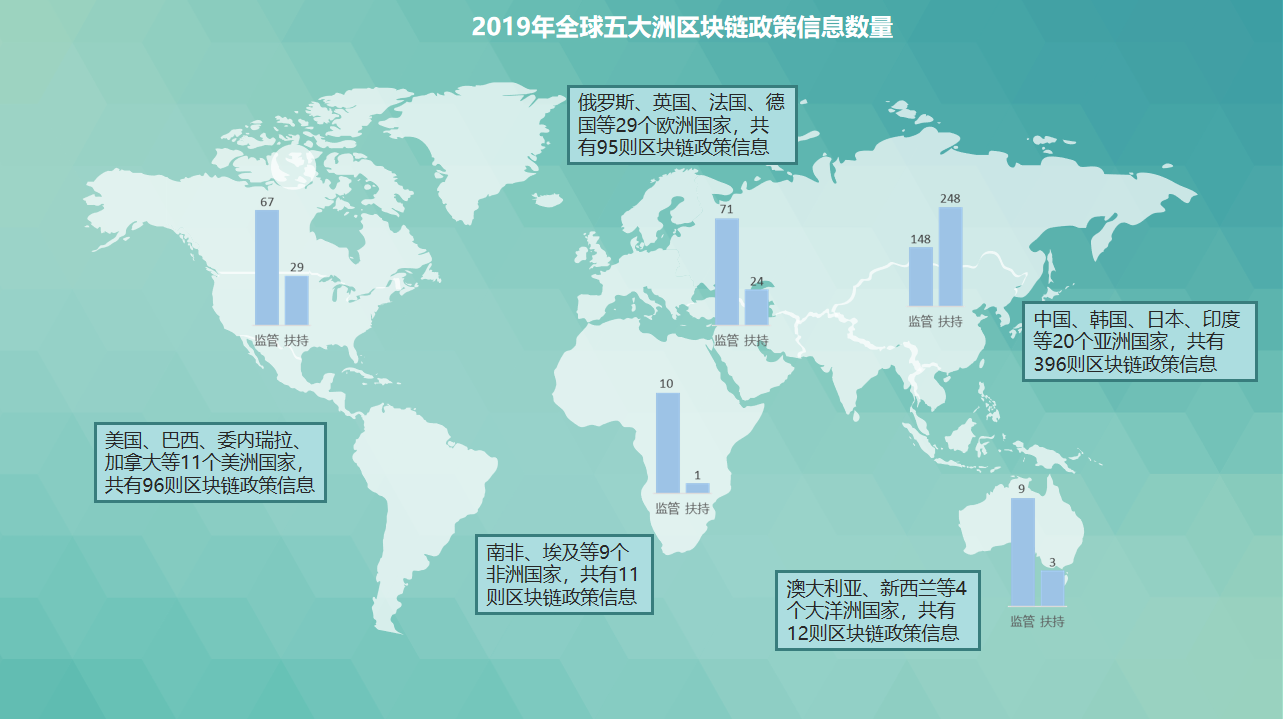 (Drawing: Interlink Pulse Academy)
(Drawing: Interlink Pulse Academy)
It is further subdivided into countries. China has the most blockchain policy information, with a total of 264, and it is mainly supportive.
The United States ranked second in number, with a total of 64, and most of them were mainly regulated. In terms of regulation, the U.S. Congress and state governments have introduced policy information around cryptocurrency regulation.
In addition, US regulation is mainly promoted by the SEC (United States Securities and Exchange Commission) and the Internal Revenue Service. In 2019, the U.S. SEC issued guidelines to help determine the legality of digital currency securities; issued warnings on fraudulent crypto asset trading sites and the crypto industry. Since the end of May, the IRS has begun regulating crypto taxes. In June, the IRS identified several specific issues regarding crypto taxation, and began reviewing taxpayer cryptocurrency assets at the end of June; in October, the IRS issued its first cryptocurrency tax guide in five years and stated or will Increased audits of cryptocurrency traders; at the end of the year, the IRS issued tax guidance on cryptocurrency forks.
In terms of support, most of the support in the United States was around digital assets at the beginning of the year, such as providing clear digital asset business licenses for banks. Subsequent supporting policy information is more for the purpose of promoting the legalization of blockchain technology and promoting blockchain applications, such as allowing government entities to adopt blockchain technology and signing bills that incorporate blockchain technology into law.
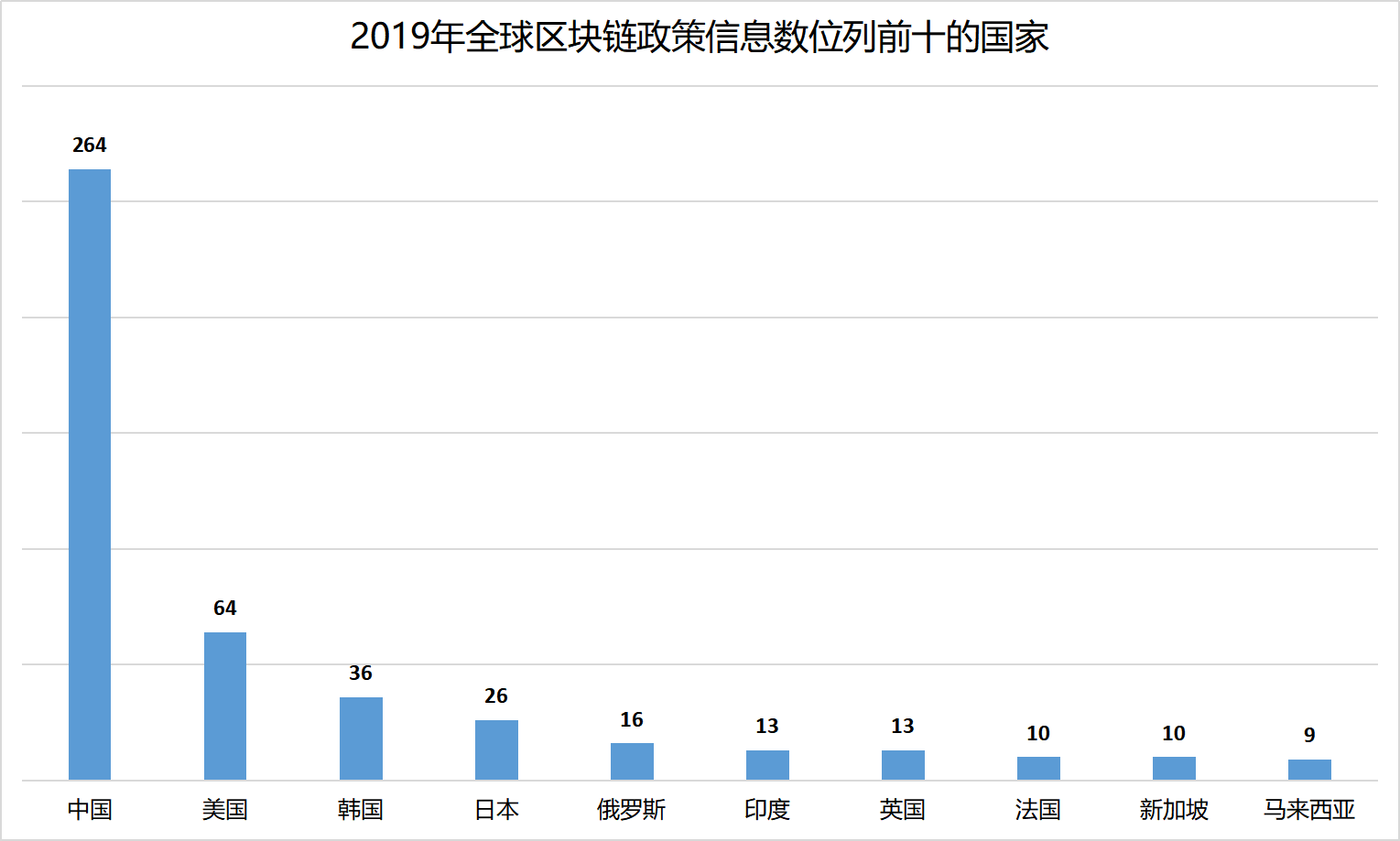 (Drawing: Interlink Pulse Academy)
(Drawing: Interlink Pulse Academy)
The number of blockchain policy information is behind the United States, followed by South Korea, with a total of 36, mostly supporting.
Mutual Chain Pulse has observed that most of South Korea's support has fallen into funding. And South Korea has now formed three development bases in Seoul, Busan, and Jeju Island. Seoul, South Korea plans to build a world-class entrepreneurial city centered on new industrial bases such as blockchain; Busan was selected as the South Korea Blockchain Regulation Free Zone, and Busan also said in July that it will issue blockchain-based "Stable currency"; Jeju-do, South Korea is the roadmap for the planned completion of blockchain cities.
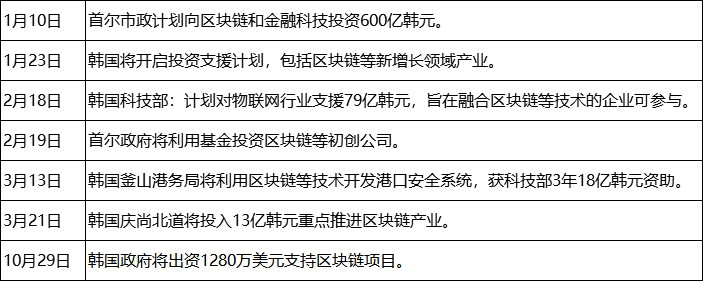
(Tabulation: Interlink Pulse Academy)
Regarding supervision, in the first half of the year, the South Korean government began to implement a regulatory sandbox system; in the second half of the year, South Korean regulators paid more attention to cryptocurrency exchanges. And at the end of the year, South Korea also said it would levy taxes on virtual currencies.
Japan ranked fourth in policy information, with a total of 26, of which only 4 related to support, focusing on supervision. Regarding blockchain supervision, the Japanese government has launched relevant policy information on virtual currencies, virtual currency exchanges, virtual currency taxation, anti-money laundering, ICO, IEO and other aspects.
Russia ranks fifth with a total of 16 and is also heavily regulated. In terms of supervision, it is mainly aimed at cryptocurrency and cryptocurrency mining. In addition, it was reported in November that the new Russian law may allow police to confiscate Bitcoin from 2021. In terms of support, Russia has somewhat relaxed digital asset and cryptocurrency transactions.
2019 domestic blockchain policy information: Guangdong, Shandong, Beijing, and Fujian top the number of policies in the first 11 months, surged 140%
With 264 pieces of blockchain policy information, China ranks first in the number of policies in countries around the world in 2019. Among them, most of them are mainly support. There are 204 policy information related to blockchain support throughout the year, and 60 information related to blockchain supervision.
The interchain pulse counts the above information from the time dimension. It can be seen from the statistical chart that after October, the number of policies at the end of the year and two months surged, and in November it increased by 140% month-on-month, and they were mainly based on supporting policy information. During these two months, many domestic provinces and cities held meetings, launched heavy documents or development plans, and proposed to accelerate the integration of blockchain and the real economy. The central ministries and commissions encourage the application of blockchain technology in the fields of trade, taxation, cross-border finance, agriculture, and transportation. At the end of the year, the Supreme Law also proposed to promote the construction of the Digital Silk Road, including the blockchain.
In addition, the second peak number of policies in 2019 is at the beginning of the year. At the beginning of the year, many provinces and cities proposed the development of blockchain in the government work report.
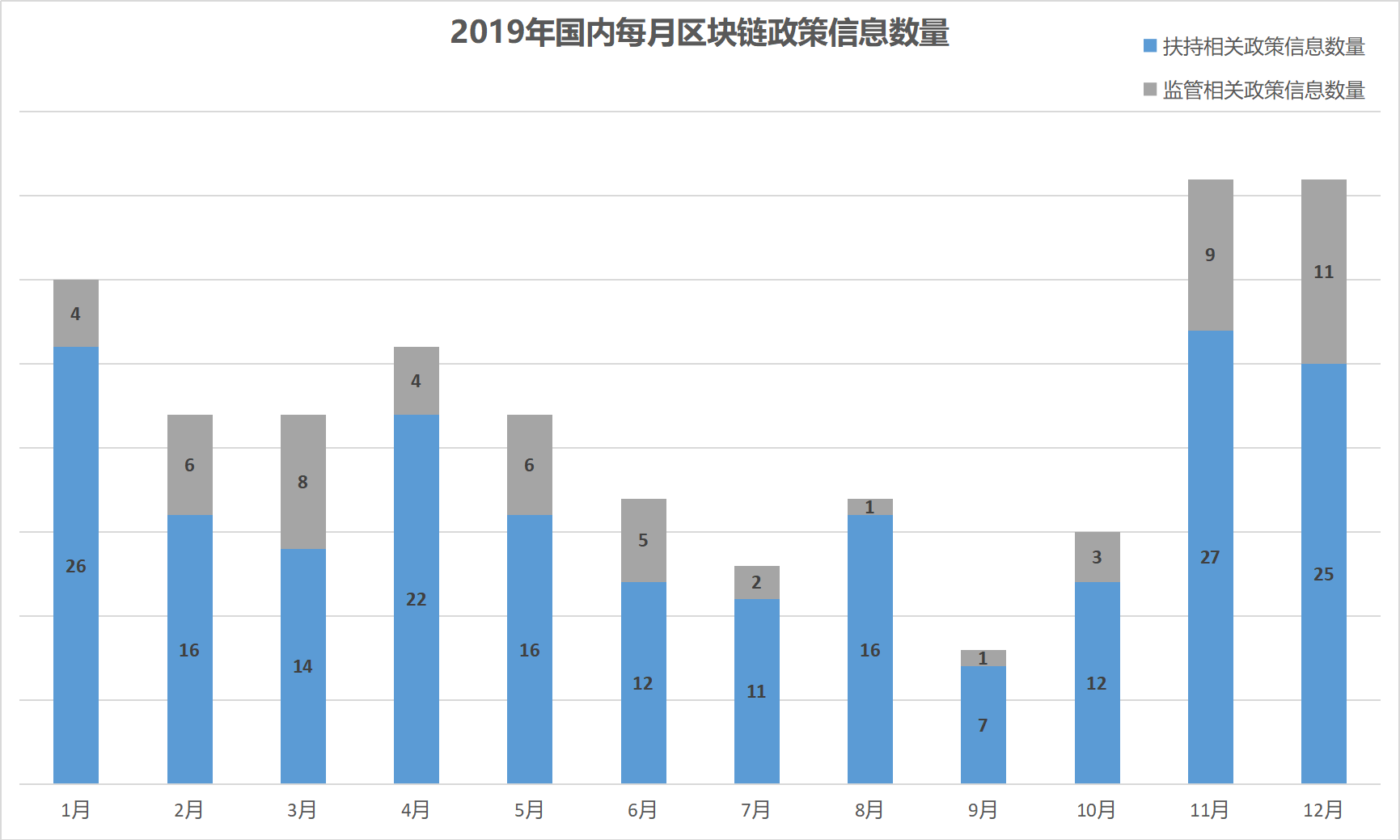 (Drawing: Interlink Pulse Academy)
(Drawing: Interlink Pulse Academy)
If we pay more attention to the areas where the blockchain policy information is introduced, it can be seen that, in addition to the central ministries and commissions, in 2019, a total of 27 provinces and cities across the country announced blockchain policy information. Among them, the central ministries and commissions issued the most policy information, with 62, followed by Guangdong, with 28 in total; 19 in Shandong; 14 in Beijing and Fujian; and 13 in Zhejiang and Yunnan.
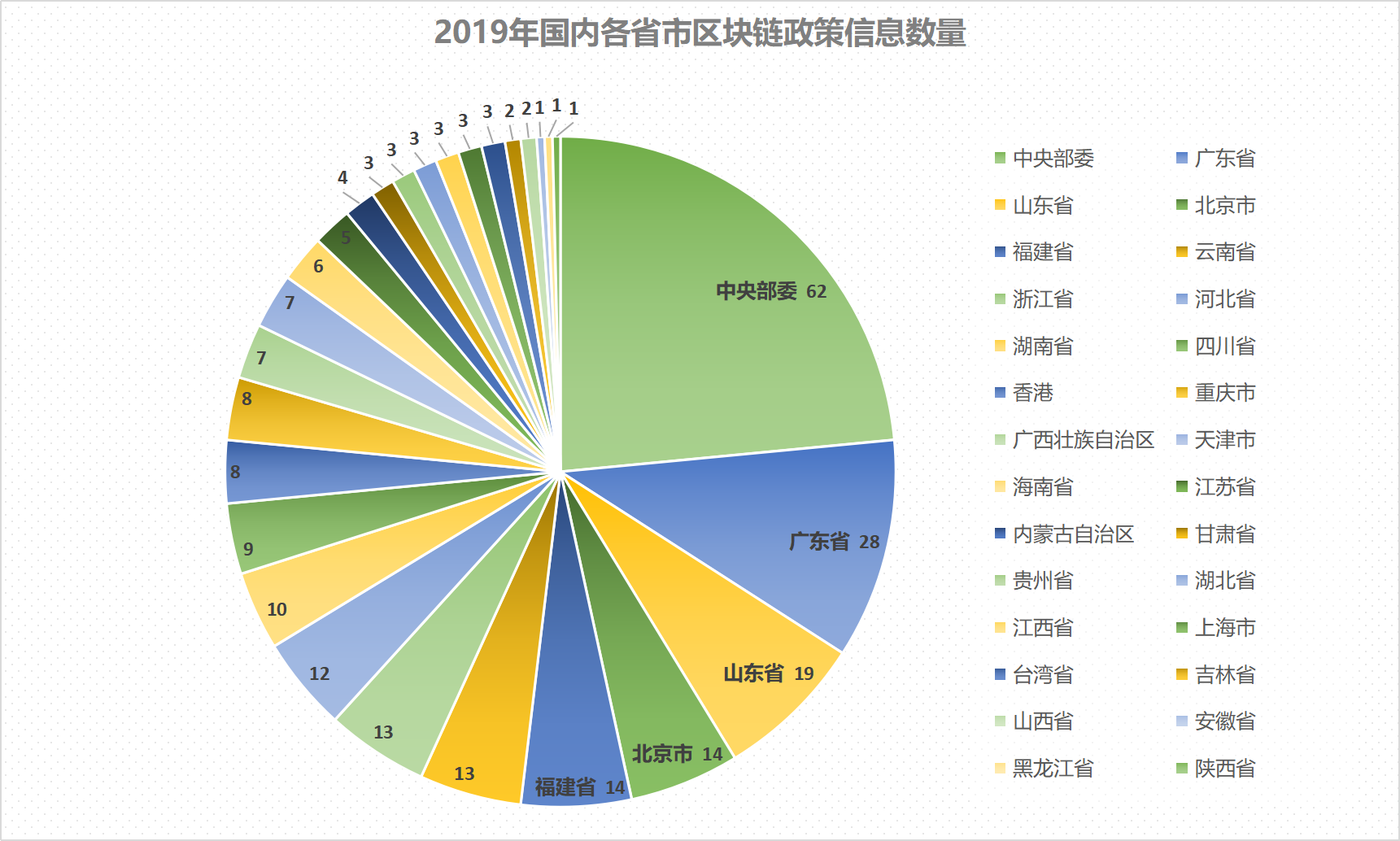 (Drawing: Interlink Pulse Academy)
(Drawing: Interlink Pulse Academy)
In terms of quantity, the central ministries and commissions also give greater support to the blockchain. This support falls on the one hand to promote the development of digital currency of the central bank; on the other hand, it promotes the application of blockchain technology in the fields of justice, digital identity, food security, military industry, and transportation. In addition, the "Blockchain as an important breakthrough in independent innovation of core technology" proposed in October has greatly promoted the development of blockchain. In terms of supervision, it is mainly for illegal fund-raising crimes and anti-money laundering.
Guangdong Province, which has the largest number of blockchain policies in various provinces and cities, also focuses on support. Of the 28 blockchain policy information, 25 are related to support.
Shenzhen, Guangdong Province, Huangpu District, Guangzhou City, Foshan City, Zhuhai City, Jiangmen City, Zhongshan City and other places are all promoting the development of the application of blockchain. In March, Guangzhou Huangpu issued the "Blockchain 10 2.0" policy; in December, the "Shenzhen Construction Pioneering Demonstration Zone Action Plan (2019-2025)" was officially issued, and Shenzhen Futian District will accelerate the completion of the country's first digital currency building. The supervision of Guangdong Province mainly lies in Shenzhen's investigation and rectification of illegal activities of "virtual currency".
The 19 blockchain policy information of Shandong Province are also mainly supportive. Among them, Qingdao is the main force to promote the application of blockchain. In October, the document "Measures for the Development of Blockchain Industry in Shibei District of Qingdao Shibei District Science and Technology Bureau (Trial)" was issued. In December, Qingdao City Laoshan District issued a three-year action plan for the development of the blockchain industry.
Statistics show that most of the support in Shandong Province is Jinan City, Qingdao City, Linyi City, and Tai'an City; while the supervision is carried out in Dezhou City, Yantai City, and Weihai City to supervise the illegal financing of virtual currencies.
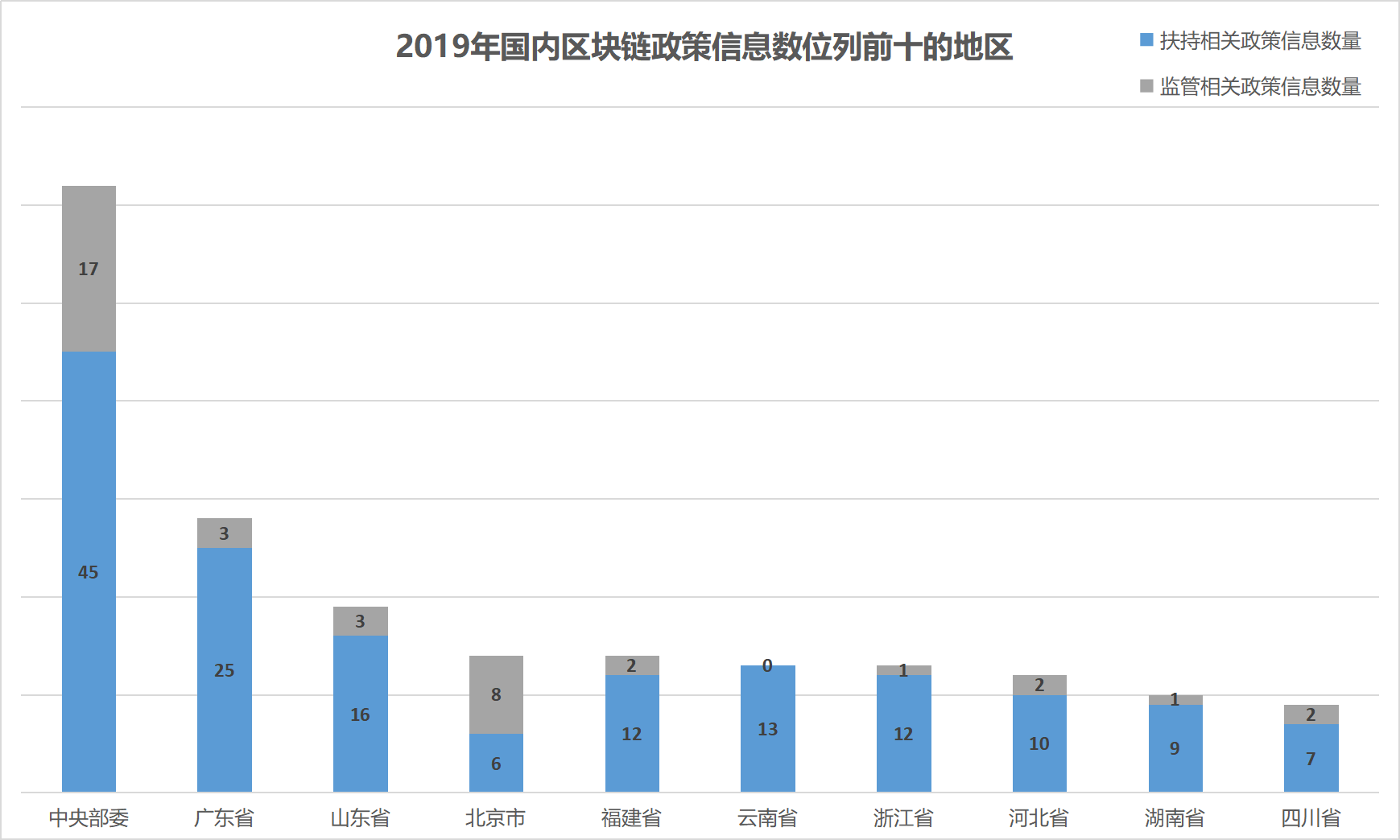 (Drawing: Interlink Pulse Academy)
(Drawing: Interlink Pulse Academy)
In addition, Mutual Chain Pulse is concerned that among the top ten regions and institutions in terms of domestic policy information, only Beijing has more regulatory policies than supporting policies. Blockchain supervision in Beijing is the crackdown and supervision of virtual currency crimes by the Beijing Banking and Insurance Regulatory Bureau, the Mutual Fund Association, the Financial Supervision Bureau, the Securities Regulatory Bureau, and the public security organs. The support lies in the promotion of the application of blockchain and the subsidy to blockchain companies.
Fujian Province, like Beijing, has a total of 14 blockchain policy related information. However, most of Fujian's policy information is supportive, as many as 12. Fuzhou City, Xiamen City and Quanzhou City in Fujian Province are all promoting the development of blockchain. In May, Fuzhou issued three policies to support the development of blockchain; at the end of November, Xiamen issued four heavy documents to accelerate the integration of new generation information technology such as blockchain with the real economy.
The number of blockchain policies in Zhejiang Province in 2019 is not as large as expected, as in Yunnan, there are 13 in total. Support is also the main, and Yunnan has proposed funding support. In October, Kunming issued a policy to support the digital economy, with a maximum subsidy of 10 million yuan for demonstration applications in scenarios such as blockchain.
Frequent words for global policy: cryptocurrencies, finance, central banks, exchanges
After looking at the domestic and international blockchain policies from the time and regional dimensions, the mutual chain pulse further analyzed the content of the policies. Use word frequency tools to analyze keywords in policies. Among them, in addition to the blockchain, the word with the highest frequency of global blockchain policy information is "cryptocurrency" (currency appears 216 times, encryption appears 201 times, and cryptocurrency appears 132 times).
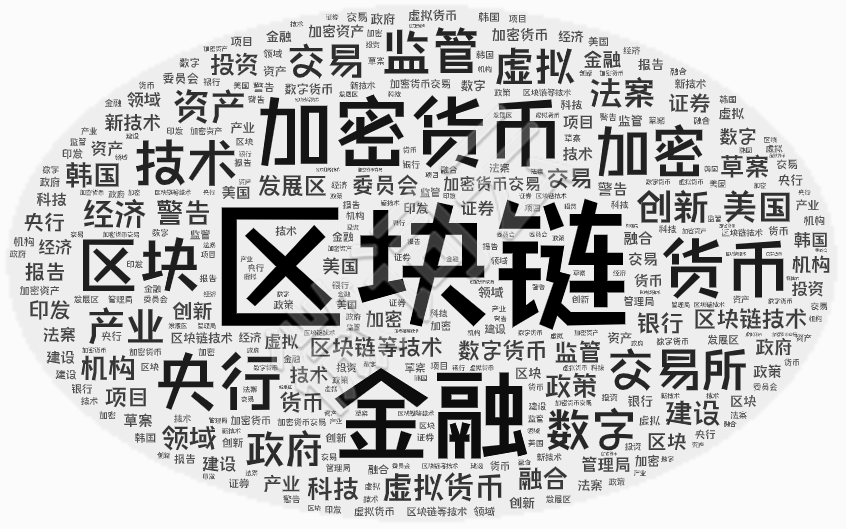
(Drawing: Interlink Pulse Institute Tool: Micro Word Cloud)
The expression of this word in policy is, on the one hand, the regulation of cryptocurrencies by various countries; on the other hand, some countries are focusing on promoting the legalization of cryptocurrencies. For example, in January, Iran stated that it would launch a state-backed cryptocurrency; in June, Marshall established a special fund to support its national cryptocurrency; in September, Ukraine plans to legalize the cryptocurrency. The same high-frequency virtual currency is all regulatory information.
In addition to "cryptocurrency", "finance" is the second most frequent term. China, South Korea, and Russia are all promoting the application of blockchain in the financial field; and financial institutions in many countries are monitoring the risks of blockchain in anti-money laundering.
And "the central bank" is the third high-frequency word worthy of attention. It can be seen that the central bank of China, the central bank of Thailand, the central bank of the Bahamas, the central bank of Canada, the central bank of Tunisia, and the Eastern Caribbean central bank are all exploring and piloting their central bank digital currencies; while the central banks of Spain, Mexico, Brazil, Iran, and Myanmar have Cryptocurrency is regulated.
In addition, “exchanges” also appear in policy information, which is mainly reflected in the regulatory aspect. In addition to the United States and Japan, Singapore, Brazil, Malaysia and other countries have also initiated supervision of digital currency exchanges. In January, the Singapore government proposed that digital currency transactions need to apply for a license to operate in compliance; in June, the Brazilian Federal Revenue Agency required crypto exchanges to report user transaction data; in July, Malaysia ordered the closure of all unregistered crypto exchanges.
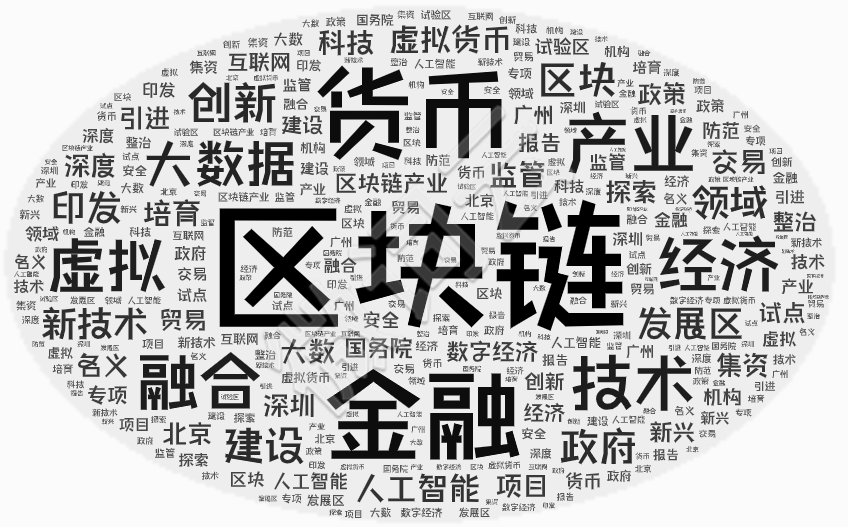
(Drawing: Interlink Pulse Institute Tool: Micro Word Cloud)
For domestic blockchain policy information, the inter-chain pulse also conducted a related word frequency search. In addition to blockchain and currency, the more frequent word is "industry". It is mainly reflected in supporting policy information. When referring to the blockchain, it is often classified as an emerging industry, a future industry, and a cutting-edge industry.
And the same high-frequency word is "finance", mainly because of the domestic efforts to promote the application of blockchain in supply chain finance, cross-border finance and other fields.
Finally, "fusion, big data, artificial intelligence" is also a term that often appears in domestic blockchain policy information. This is not only reflected in the policy of dividing the blockchain into emerging technologies such as big data and artificial intelligence, but also in the country's promotion of the integration of blockchain technology with big data and artificial intelligence.
In summary, countries not only carry out supervision on cryptocurrencies and exchanges, but also focus on promoting the development of blockchain finance and the implementation of central bank digital currencies. Based on this, China has put the development of the blockchain on the agenda.
We will continue to update Blocking; if you have any questions or suggestions, please contact us!
Was this article helpful?
93 out of 132 found this helpful
Related articles
- Bitcoin 12th year: building tools for the future in the "chaotic era"
- One week in review | Ethereum implements "Muel Glacier" upgrade; Bitmain launches personnel optimization plan
- Why are these 7 areas of blockchain worthy of attention in 2020? Pantera partner Paul Veradittakit shares his views
- Securities Times: The most significant application of China's securities industry in blockchain technology is the promotion of ABS business
- Blockchain + Urban Governance: Obviously there is a strong demand, why are you worried?
- Iran's domestic bitcoin premium is serious, bitcoin sells for up to 24,000 US dollars
- CSI: The most significant application of blockchain in the securities industry is the promotion of ABS business






